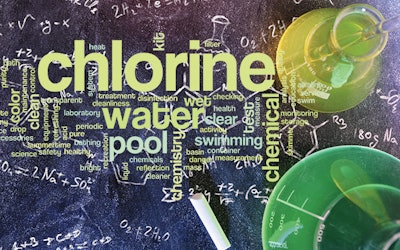
In this era of how-to YouTube videos and seemingly infinite internet resources, it’s no surprise many pool owners attempt to take on maintaining their pool and spa water chemistry. Some do it out of necessity, others because they’re gung-ho and like the challenge and still others just like taking care of their own stuff.
Regardless of the reason, teaching pool owners the basics of water chemistry carries significant implications for pool and spa companies, especially retailers. As brick-and-mortar stores face mounting challenges from mass merchandisers and the internet, customer education has become more crucial than ever. In fact, some pool and spa professionals say education is the one and only silver bullet industry professionals have in their struggle to retain customers and find new ones.
The problem is that chemistry is not the easiest nor most enticing subject for most freshman pool owners. It can be quite daunting for those with no experience using a test kit or maintaining chlorine residuals and balanced pH and alkalinity. Thus, for the retailer, teaching chemistry well is both a challenge and an opportunity.
MEETING NEEDS
In the broadest sense, taking the time to educate consumers about chemistry seems a no brainer. All pools and spas require chemical maintenance, along with routine cleaning. Teaching chemistry empowers homeowners and boosts their loyalty. It’s a win-win.
RELATED: Step Up Your Game with Industry Education
“I think it’s something every pool company should do,” says Dan Lenz, vice president of All Seasons Pools and Spas in Orland Park, Ill. “Educating the pool owner is what differentiates a pool professional from everybody else. Everyone who owns a pool or a spa can go to Walmart, Home Depot and Ace Hardware and buy chemicals. When they walk down the aisle and pick up a bottle of this or a jug of that, there’s no one there asking, ‘Can I test your water?’ There’s no one there to explain why they should use an algaecide or a pH increaser or a clarifier. That know-how and service does not exist in a box store or on the internet. That can only exist in a place staffed with experienced professionals.”
Once established, that expert/ student bond is tough to break. “When you educate people, you become their man from Mars and they will always return to you as a resource because there’s trust,” says Juliet Phelps, co-owner of Ajax Pool & Spa in Basalt, Colo. “It helps customers protect their investment and get more enjoyment out of their pool or spa. That’s why I’ve taught more than a thousand people how to manage water chemistry. They have a better experience when they know what they’re doing and why you do it.”
GOING TO CLASS
As discussed briefly in the sidebar (see “Not for Everybody”), there are those in the industry who are reluctant to teach consumers the tricks of the trade, partly due the inevitable mistakes that pool DIYers will make.
“Some people are definitely better at it than others and there are people who are going to make mistakes,” says industry veteran Merry Wise, co-owner of the Wise Pool Company in Conroe, Texas. “But even so, I still believe the benefits far outweigh the costs. I do understand that some people are reluctant to teach anything because they’re afraid the homeowner will do it themselves instead of paying for service. I never worried about that. I know how to wash dishes but that doesn’t mean I’m going to give up my dishwasher.”
While chemistry instruction often takes place impromptu one-on-one, there’s a lot to be said for offering regular classes, which have the dual advantage of bringing customers into the store and doing so in groups. For some professionals, staging schools becomes a major production.
“We make a really big deal out of it because we’ve found that the pool schools are by far the best way to get people to come into our store, both existing customers and people we’re meeting for the first time,” Wise explains. “And it’s not all about chemistry and maintenance; we’ve had wine tastings to go along with the school and provided free child care. Sometimes we’ve added a swimsuit fashion show. It’s been extremely successful. Sometimes we’ve had 50 people in there.”
“Our pool school is a three-hour class and over the years I’d say it’s been successful, but not always as much as I’d like,” Lenz says. “It can be a challenge because getting people to commit that amount of time can seem daunting to them. I’ll admit it is amazing to me that someone who spends $50,000 on a pool or $200,000 or more is uninterested in spending a few hours learning about how to take care of it and protect their investment. Sometimes our schools have 40 or 50 people; at others, it’s only 7 or 8.”
RELATED: How to Improve Your Customer’s Experience This Summer
The limitations of a traditional classroom setting are a big part of why Lenz believes in teaching across multiple platforms and settings.
“The schools are great, but we take advantage of every opportunity we can to teach — when they come in the store to have their water tested, or when they have a question about a repair or a specific problem. For new builds, we give them a binder with all sorts of specific information and we walk them through all of it. And when they’re on service, our techs are always offering advice and information. It’s a constant process and our ‘classroom’ exists in every aspect of our business.”
Most recently Lenz reports he’s taken on answering questions for a pool owners’ Facebook group, which now boasts more than 5,000 members. “It’s another way to share reliable information for those people who might not be getting it elsewhere,” he says.
If you’re interested in joining, visit Facebook and search for the Swimming Pool & Spa Owners group.
WHAT TO SAY
Getting bodies in the door or otherwise grabbing their attention is only part of the battle. Because chemistry is a relatively complex subject with lots of interdependent variables, explaining it in an easily understandable way is a big part of the challenge.
“I use everyday comparisons that people can relate to because customer education is kind of an ongoing chemistry lesson, and nobody likes science or chemistry or tests!” Phelps explains. “So, I start off by saying that I am going to teach spa chemistry, but there’s not going to be a test. I keep it simple. I take out a piece of white copy paper and make a little cheat sheet for them. Later they can look at that cheat sheet and remember the things that I told them until they can keep it in their memory.”
Using the pen and blank paper, Phelps runs through the familiar litany of chemistry subtopics, possible problems, prevention and solutions.
“The first thing is chlorine,” she explains. “I talk about free chlorine and combined chlorine and how free chlorine is what kills germs, which might for example be attached to a drop of sweat. I remind them that hot tubs are about 104 degrees and that when we’re in a hot tub, we’re always sweating, which is kind of gross to think about, but it’s why we have free chlorine. I tell them that you have to have enough free chlorine for all the people who are going to use the spa. You need to have enough to disinfect the water.
“When I talk about having enough chlorine,” she adds, “I sometimes use the analogy of having enough beer in the fridge. When you’re having a party, you have to have enough beer in the fridge and when the beer is gone the party’s over. It’s the same thing with chlorine — you don’t want to be in the water with no chlorine.”
As Phelps moves through her lessons, she eases her pupils into the material with her own brand of folksy anecdotes and analogies. “When I talk about pH, I relate it to your own body, especially your face,” she says. “Your skin is one pH, your eyes are another pH and your mouth is a different pH, as well. This is why your eyes get red when you cry. Tears have a lower pH than your eyes and your skin, so you’re actually burning your eyes and the skin around them. That’s why we put cucumbers on our eyes, it neutralizes the pH and soothes your eyes. That’s all very personal, but people can relate to the pH of water when they realize how pH is part of their lives and even their own bodies.”
RELATED: Water Chemistry: Lessons Learned
“Most people really only know that they need to put chlorine in their pool. Beyond that fact, they need to be educated and directed to all the other types of products,” says Lenz. “They need to know how to use a test kit and what levels they should be shooting for. We don’t say, ‘Take this home and do this.’ We explain why. Even with our service techs, when there’s an issue with a piece of equipment or their water quality, we explain why and how we’re going to take care of it. Sometimes people just want us to take care of it with no explanation, but almost everybody wants to know, ‘Why am I having this problem? What can I do to prevent it? Why am I having to spend this money?’”
For Wise, the opportunity to emphasize the value of in-store water testing stands as one of the biggest upsides. “We always stressed the importance of coming into the store with a water sample and take advantage of our free testing,” she says. “That’s a great way to sell your customers the products they need and it’s another opportunity to teach. Most people, especially new customers, will have questions about their test results or how to use the products we recommend. We’d give them a computerized printout and go over it with them.
“When you combine an educated pool owner with our in-store testing and recommendations, that’s a powerful combination. You can avoid a lot of pool problems that way.”
IGNORANCE IS NOT BLISS
Although those interviewed for this discussion all acknowledge that educating consumers comes the likelihood they will make mistakes, the net benefits are more than worth the occasional added customer-induced crisis.
“Many people like to think they’re the DIY guru taking care of their chemistry, but the reality is they’re not doing it as often as they should,” Lenz says. “When they don’t understand what their test results mean and what they should do, that’s when they start running into trouble. It may be tough to convince some people how much they need to learn until they run into a serious problem they don’t know how to solve.”
“People who understand how to take care of their water have more positive experiences because they have fewer problems,” Wise says. “And when they do, they know they can come to us and we’ll help them fix it. So they don’t get frustrated or waste money because they’re buying a bunch of chemicals they don’t need. Through customer education, you create more loyal customers in greater numbers. Our customers love us and they love their pools because they feel like they’re in control.”











































